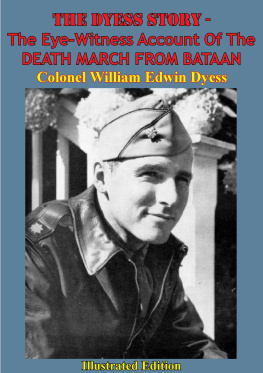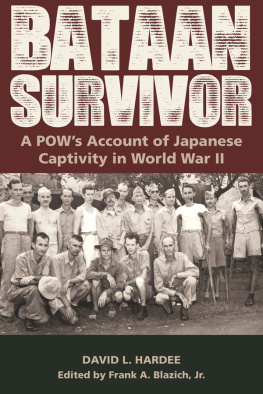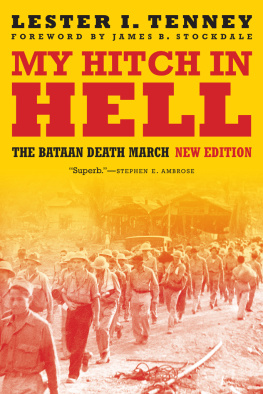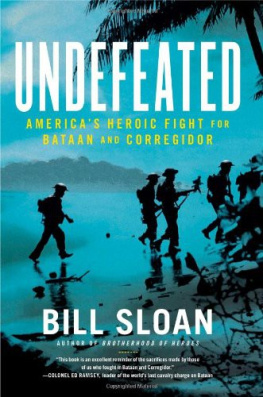Praise for Some Survived
Grim but moving, shocking yet heartwarming.
Publishers Weekly
An excellent portrayal of a facet of the second World War that has been neglected by many historians... should be required reading.
United Press International
Conveys a vivid picture of the POW experience and of the methods (some honorable, some not) desperate men will use to survive.
Booklist
Must reading... [a] straightforward account of the horrors visited on American POWs by their Japanese captors.
National Review
An experience never to be forgotten... a clear, well-written account, it is perceptive, imaginative, and moving.
Aerospace Historian
Some Survived is a story of unrelieved horror, far worse than any fictional tale ever imagined.... [Yet it does not] convey despair. On the contrary, it is inspirational.... It makes one glad to be alive.
St. Petersburg Times
Shows that the human spirit can soar like an eagle from the depths of hell on earth.
Charleston News and Courier
An honorable and absorbing testament to the courage of many, its low-key tone makes the eventual triumph of the survivors all the more glorious and remarkable.
The Columbia, SC, State
No men will ever have to undergo anything more horrendous than this.... Manny Lawton is a hero... and his book is heroic.
James Dickey
Some Survived
by Manny Lawton
with an introduction by John Toland
Algonquin Books of Chapel Hill
Published by
Algonquin Books of Chapel Hill
P.O. Box 2225
Chapel Hill, N.C. 27515-2225
a division of
Workman Publishing
225 Varick Street
New York, New York 10014
1984 by Marion R. Lawton.
First e-book edition, October 2012. Algonquin paperback, March 2004. Originally published in hardcover by Algonquin Books of Chapel Hill in 1984.
All rights reserved.
Library of Congress Cataloging-in-Publication Data is available.
The photographs of the Death March and other scenes of Japanese captivity are furnished through the courtesy of NBC-TV and by Mr. Stan Sommers, Marshfield, Wisconsin.
The sketch of American POWs is furnished through the courtesy of Mr. Ben Steele, Billings, Montana.
E-Book ISBN 978-1-56512-837-8
Front cover background photo Bettman/CORBIS. Front cover insert photo courtesy NBC-TV. Back cover background photo courtesy NBC-TV.
To Peggy, my beloved, who captured me within the year of my liberation from three and one-half years as a prisoner of war and became my wife. Over the ensuing years she has made each place we lived a Garden of Eden. She helped me salvage what might have been a wasted life and brought me a love and companionship which enabled me to forget the bitter and dreadful years that went before.
Contents
List of Illustrations
List of Maps
Preface
In August of 1985 the survivors of Bataan and Corregidor will mark the fortieth anniversary of their liberation from the hell of prisoner of war camps in the Philippines and Japan. In those four decades the world has seen more dramatic scientific progress and greater political realignment than in any previous span of history. The high speed jet airliner has become commonplace. The computer, developed in the last few years, affects every phase of our lives. Man has flown to and walked upon the moon. The Soviet Union, our wartime ally, has become our chief political competitor. Since taking over central Europe after World War II, she has moved into Cuba and Afghanistan and has gained strong footholds in Africa and Central America. Her communist philosophy now rules a great portion of Southeast Asia. The Soviets have made great progress toward their avowed aim of taking over the world. Japan, our wartime enemy, is now closely allied with America in trade and national defense.
When we came home after three and one-half years of slavery under the Japanese, we were so happy to be free that few of us wasted time hating our former enemies. While not many of our number admitted to hatred of them, very few spoke of love and forgiveness. Such feelings should be easily understood if the observer is informed as to the physical and mental abuses to which we were subjected. In these pages the reader will be taken into the very camps and prison ships in which so many lives were lost from disease and starvation. He will be pleased to see that some never lost the capacity to help and to care for their fellow man, and he will be saddened to learn that in some cases when the thin veneer of civilization is rubbed off, man can deteriorate to little more than an animal.
The loss of life was extremely high in Japanese prison camps. The exact number or percentage will probably never be recorded. From what I have read and heard from others who have put considerable thought to the subject, it would appear that over fifty percent of those captured did not survive. In their documentary, Bataan: The Forgotten Hell, the National Broadcasting Company said fifty-seven percent died. That is probably close to the right figure. We do know that close to 5,000 were lost at sea when their unmarked prison ships were bombed or torpedoed by our own Navy. Those ships were: Shinyo Maru, torpedoed off Sindangan Point, Mindanao, P.I., December 7, 1944, with a loss of 688 prisoners, 83 reached shore; Arisan Maru, torpedoed October 24, 1944, in South China Sea, 1,792 lost, 8 survived; Oryoku Maru, December 15, 1944, off Bataan coast near Subic Bay. Survivors from the latter were put on the Enoura Maru and the Brazil Maru. After a forty-seven-day journey they reached Japan with 375 survivors, 1,243 having been lost in two bombings. Dr. Julien M. Goodman is quoted as having said that another ship, name unknown, was torpedoed on October 18, 1944, with a loss of 1,100 prisoners. There were at least a half-dozen other ships which transported prisoners from Manila to Japan. Due to the heat and thirst and crowded conditions, at least three hundred died on those ships.
On land, in camps that I have heard of, the losses totaled 5,950. They were: on the Death March, approximately 1,000; camps, ODonnell, 2,200; Cabanatuan, 2,600; Palawan, 150. Throughout the Philippines, Japan, Formosa, Korea and Manchuria there were at least fifty other camps with prison populations ranging from 150 to 500. All had deaths. The lowest figure was in Jinsen, Korea, where only one died, while another camp in Japan had over one hundred deaths. A reasonable guess would be an average of ten per camp which would add up to another five hundred. When we add all of the above losses together the figure comes to 11,573. That is no doubt a very conservative number. In the years following the war the mortality rate of the survivors has been much higher than in the population as a whole. Before they reached the average age of sixty, it was estimated that only about 5,000 of the approximately 24,000 who were captured in the Philippines were still alive. Many of the present-day survivors are in very poor health as a result of the stress and strain they were forced to withstand.
In recent years I have seen approximately one thousand of the survivors and have grown to love them more and more. To a man and woman, they are some of the finest Americans I have ever known. Their loyalty to their country and to each other radiates a quality of human love which would melt the hearts of even the most cynical. It is their story that is being told in these pages. I am sure that the survivors join me in paying tribute to our courageous comrades who lost their lives in service to our country.







